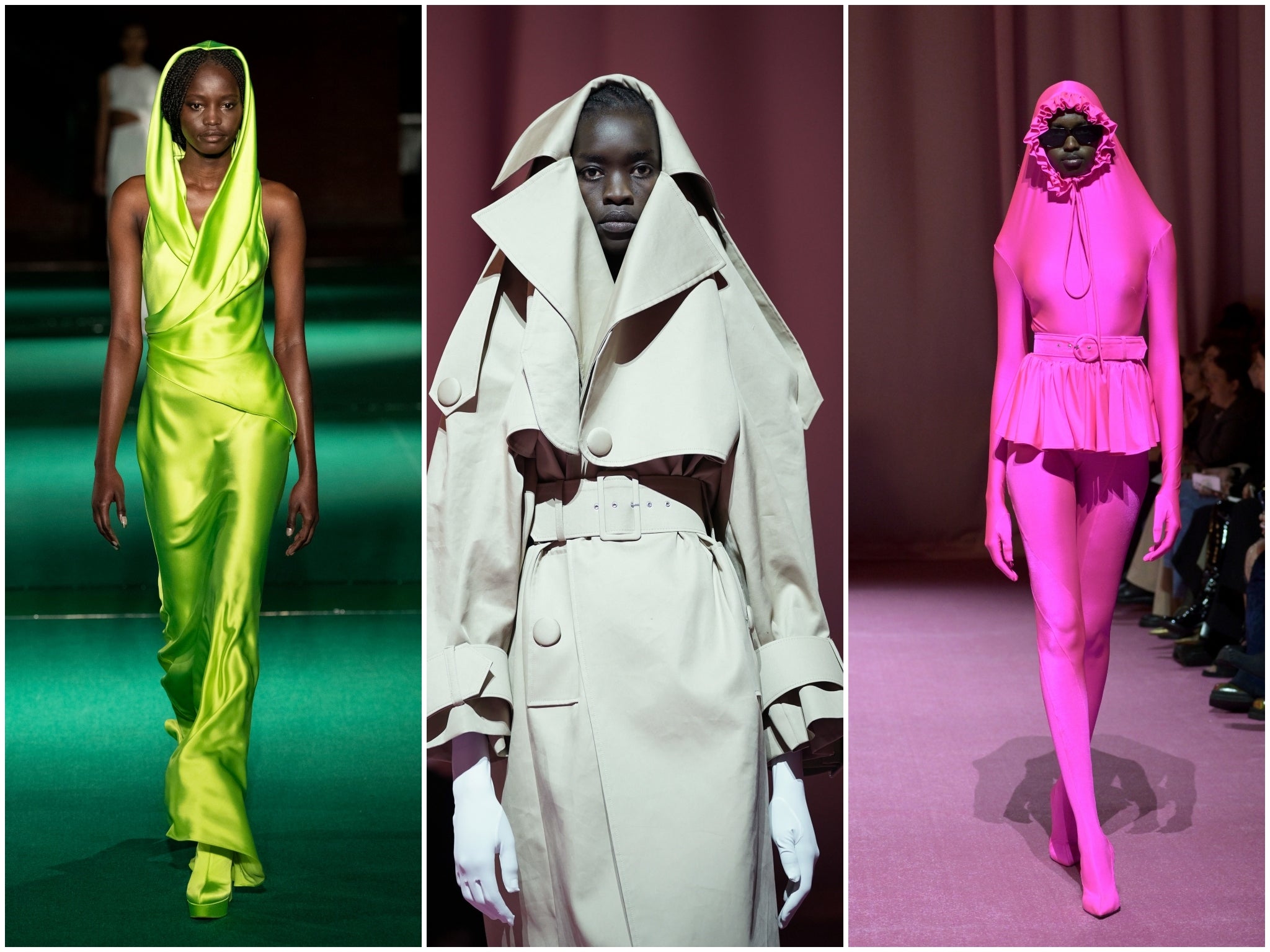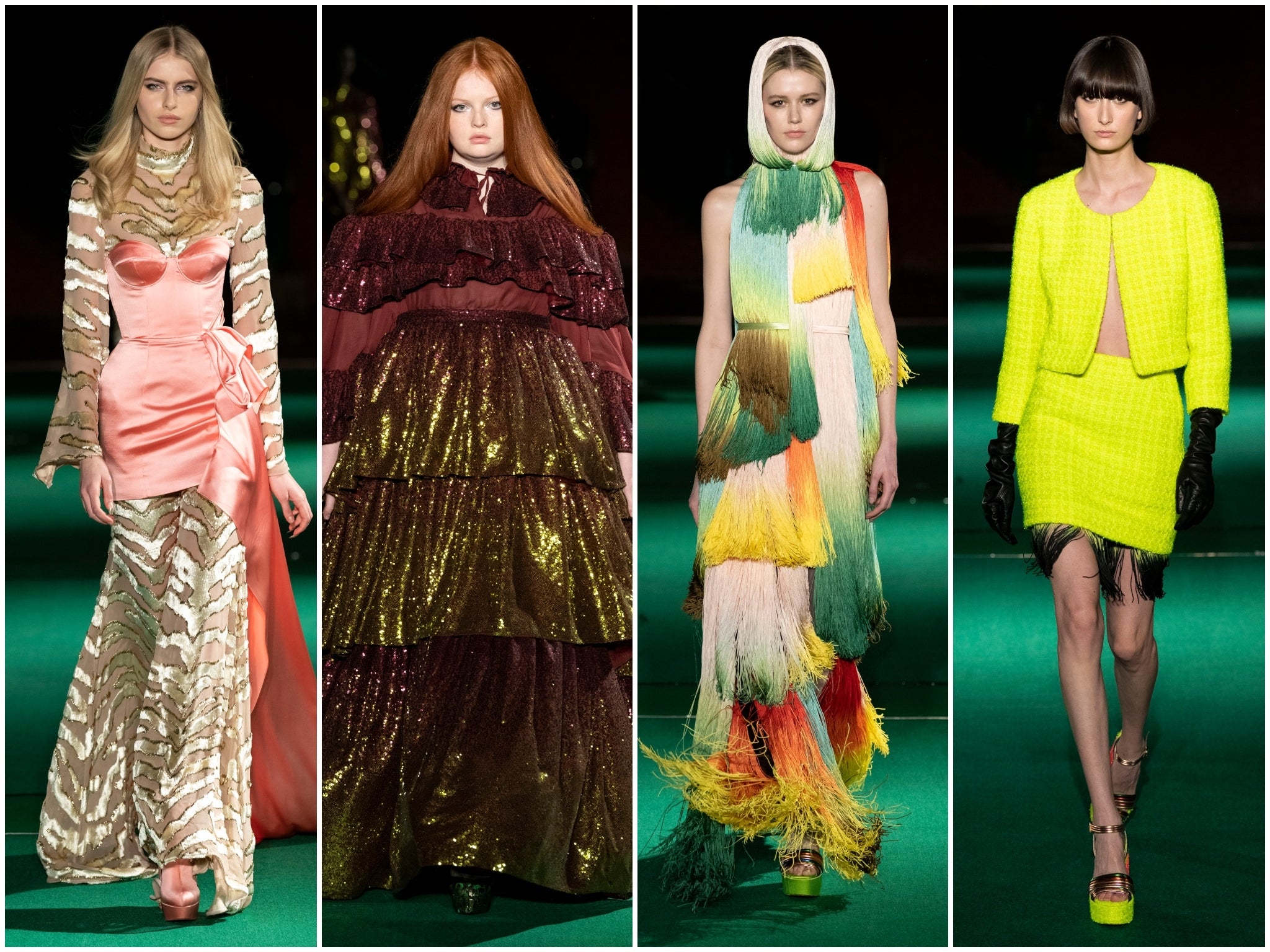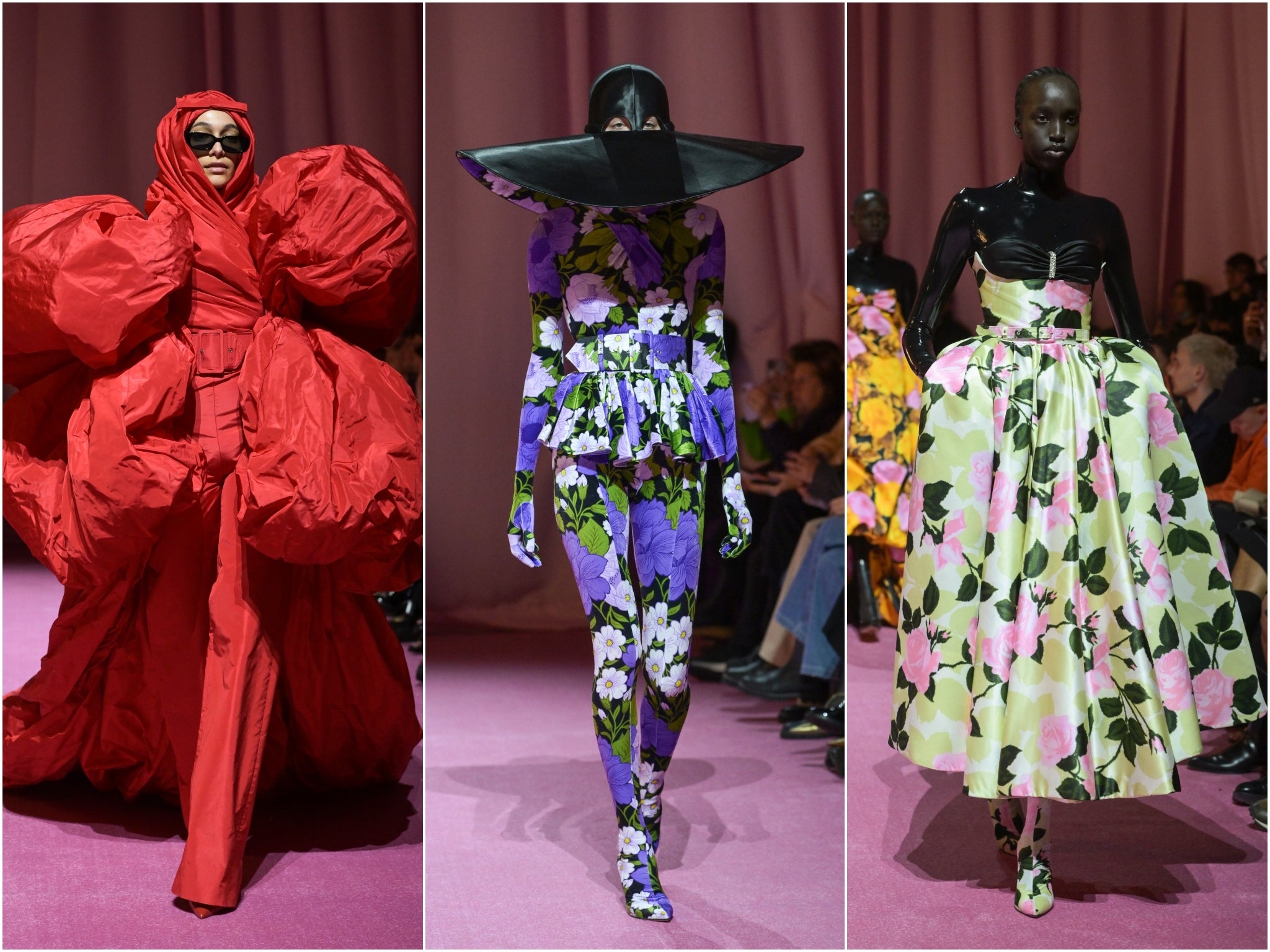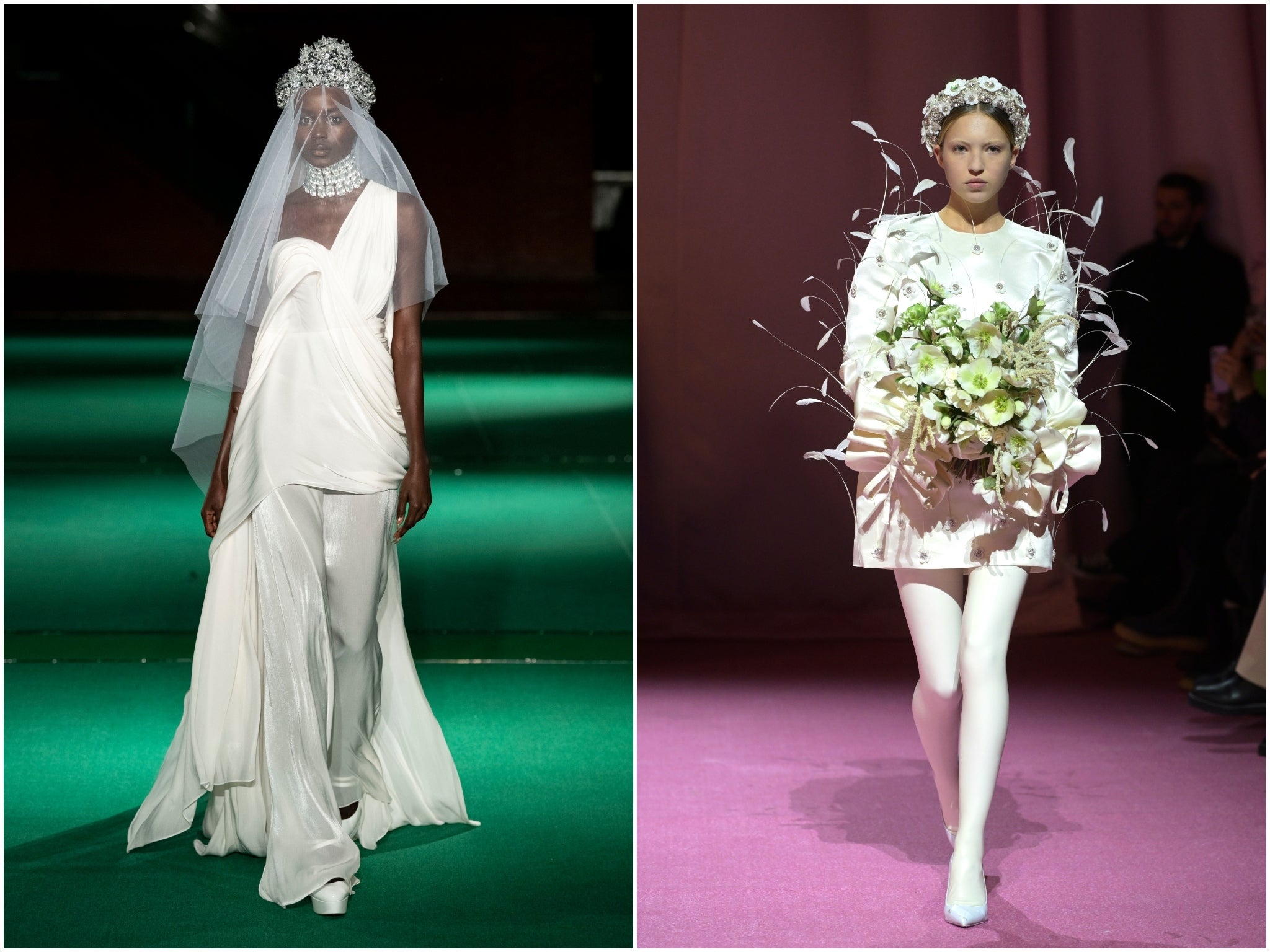London Fashion Week: Hoods get a glam makeover at Halpern and Richard Quinn
Designers offer the ultimate antidote to the drabness of the past two years as the humble hoodie is transformed, writes Harriet Hall


Your support helps us to tell the story
From reproductive rights to climate change to Big Tech, The Independent is on the ground when the story is developing. Whether it's investigating the financials of Elon Musk's pro-Trump PAC or producing our latest documentary, 'The A Word', which shines a light on the American women fighting for reproductive rights, we know how important it is to parse out the facts from the messaging.
At such a critical moment in US history, we need reporters on the ground. Your donation allows us to keep sending journalists to speak to both sides of the story.
The Independent is trusted by Americans across the entire political spectrum. And unlike many other quality news outlets, we choose not to lock Americans out of our reporting and analysis with paywalls. We believe quality journalism should be available to everyone, paid for by those who can afford it.
Your support makes all the difference.It’s been a funny sort of time for the fashion industry.
A business that pivots entirely around the ultimately inessential (clothes, yes; fashion, no) has felt superfluous to a sartorial period defined by tracksuits, slippers and Zoom earrings.
In the Covid era, essential evolved from a technicality to a badge of honour: essential worker, essential travel, essential PPE.
Michael Halpern is awake to this. For his first pandemic collection back in September 2020, the New York-born, London-based designer eschewed models for pandemic heroes – NHS and TfL (Transport for London) workers among them – and presented a virtual collection instead of a catwalk.
Last season, Halpern stripped back even further, reducing the amount of contact necessary between crew by delivering a photoshoot instead of a catwalk.
No doubt this season’s return to a real runway for a designer known for putting on fabulous Studio 54-inspired presentations, must have felt like a glorious rebirth.
Held in the curiously incongruous setting of the Brixton Recreation Centre (though show notes explain this is part of the designer’s ongoing pledge to supporting community since the pandemic, and that the power installed for the show will be donated to the centre afterwards), Halpern’s autumn/winter 2022 collection was a celebration of dazzling eveningwear.
After two cancelled party seasons, it’s no wonder the designer defined by hyper-glamourous occasion dressing and an adoration of sequins would want to be bold. And bold he was, unleashing a collection of opulent satin, sequins, and embellishment.

The collection focuses on the question: “What if it was all a dream?” It is about “infusing real life with a kind of glamour that will lift the spirits”. It was the ultimate antidote to the drabness of the past two years and an embracing of the return to red carpet dressing.
The Halpern brand has seen huge commercial success since the designer’s graduation from Central Saint Martins in 2017 and this collection offered something for a range of women, from his signature disco aesthetic seen in flowing flares and electric shots of neon, to blush pink ruched column dresses and hand tie-dyed fringing.
A bridal look complete with a crystal-encrusted crown worn on top of a floor-length gown will certainly appeal for post-pandemic weddings.
Most beautiful was a green dress with inbuilt cowl hood that extended delicately up from a crossover neckline and flowed gracefully off the backs of the head – a subtle nod to our work-from-home loungewear emerging from the chrysalis into post-pandemic glamour.
It was a collection that embraced experimentation, with some looks feeling a little irresolute in their construction (slightly barmy fringing and some playing with cut-outs, straps, ties, and mismatched sleeves didn’t always come off), but Halpern’s demi-couture approach to dressmaking lends itself to innovation and it felt fitting for London’s left-field fashion scene to see a designer enjoy experimenting with new cuts.

Nowhere is experimentation more evident than at Richard Quinn, where autumn/winter 2022 was also an opportunity to find joy in life after the pause of Covid.
In his signature manner, the Peckham-based designer opted for magnificent showmanship, hosting his catwalk in Pimlico’s Royal Horticultural Hall, which he had transformed with floor-to-ceiling pink draping, a pink carpet and flora and fauna borders, with crystal chandeliers held up by men in latex gimp suits – just to ensure things weren’t looking too saccharine.
Quinn has previously joked that he’s allergic to the traditional runway presentation. The designer prefers to present a performance, immersing showgoers in his world, the clothes forming part of an experience rather than singled out as the sole focus.
As the show began a string orchestra took its place in the centre of the catwalk and began to play a rendition of Samuel Barber’s film-famous “Adagio for Strings” as front row, TikTok stars Jourdan Dunn and Anna Wintour watched on.
Quinn’s show is an unmissable staple of the London calendar, his famously being the only fashion week event the Queen has ever attended in her 70-year reign, when she presented him with the inaugural Queen Elizabeth II Award for British Design in 2018.
For AW22, a series of 1960s-style cocoon coats and large structured hats, both in Quinn’s trademark graphic floral print, opened the show, and the collection became more avant-garde as each model emerged from backstage.

Entire floral looks saw models in matching skirts, skin-tight polo-necks, tights, globes, bags, shoes and hats. More elaborate pieces were structured suits with stiff peplums embellished with floral beading – a display of Quinn’s masterful couture-inspired craftmanship.
There were commercially friendly pieces, too. A selection of floaty floral dresses and loose pencil skirts – the items that have seen Quinn partner with the likes of Liberty and Debenhams. To undermine any Victorian sensibility, Quinn played with fetish wear through black latex under-layers, clashing with the chintz.
But the magic of this collection was in the further experimentation with headwear. Alongside the super-size hats, a focus on hooding dominated the second half of the collection – “a love letter to silhouette and craft” – but where Halpern’s hoods were silky extensions of dresses draped over heads that could easily be pulled down, Quinn’s were the garment’s raison d’etre.
A trench coat was designed pulled entirely over the head as to protect the wearer from a storm. But these were not spontaneously yanked over the head, instead they were structured without shoulders to form one continuous line from head to ankle.
Various dresses were worn like nuns’ habits, with just the face visible amid a sea of fuchsia chiffon or harlequin sequins.
Other tops were wrapped and ruched from the waist and pulled up over the head to swaddle the wearer; some hoods were pulled around the head with elastic, forming petal-like frames to the face.
For Quinn, hoods here were part of the body, structured into the look rather than an optional extra. Bodies and heads were cocooned in protective helmet-like constructions that engulfed the wearer and transomed garments into a sort of couture armour.
Dresses, coats and ball gowns were all pulled up so that shoulders and collars became the sides of hoods, playing with construction in a truly experimental collection that clashed modest dressing with the avant-garde and the practical.
“The collection acts as an exploration of intricate fabrications and elevated shapes,” said the show notes, referencing also “structured volumes”.
There’s always a feeling of discomfort when the fashion world dabbles in head coverings, given the fraught tension felt by many who wear the hijab, but Quinn’s hoods came in such a range of approaches and were modelled by a diverse cast of models so that any suggestion of cultural insensitivity was replaced by a clear exploration of form silhouette.
Quinn’s collection also ended on a bridal look, a reference he and Halpern have made respectively to their couture approach to ready-to-wear (the final look of a couture collection is traditionally a bridal gown).
Quinn’s was a long-sleeved crystal embellished minidress with a forcefield of feathers. Thankfully, the designer launched a bridal branch in 2020 so the affianced can expect plenty more where that came from.



Join our commenting forum
Join thought-provoking conversations, follow other Independent readers and see their replies
Comments